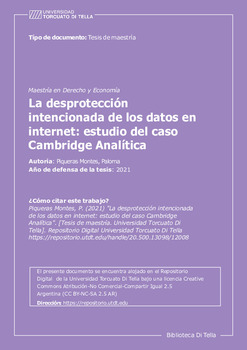| dc.rights.license | https://creativecommons.org/licenses/by-sa/2.5/ar/ | es_AR |
| dc.contributor.advisor | Celani, Marcelo | |
| dc.contributor.author | Piqueras Montes, Paloma | es_AR |
| dc.date.accessioned | 2023-08-18T20:00:45Z | |
| dc.date.available | 2023-08-18T20:00:45Z | |
| dc.date.issued | 2021 | |
| dc.identifier.uri | https://repositorio.utdt.edu/handle/20.500.13098/12008 | |
| dc.description.abstract | En la actualidad, Facebook, así como otras redes sociales y plataformas digitales, se ha hecho esencial para el funcionamiento y costumbre de las sociedades. Los mercados digitales y los grandes gigantes tecnológicos han hecho mutar la forma en la consumimos y nos relacionamos. Aprovechando la vanguardia que constituyen, los desarrolladores web han obtenido voluntaria e involuntariamente, aunque casi siempre sin transparencia, datos de los usuarios que han utilizado para inclinar a su favor las preferencias de consumo. Esto podría ser una conducta reprochable pero más peligrosa es aún cuando se utiliza en política, suponiendo un ataque a los estados de derecho y sus garantías más primarias. Esto fue lo que pasó con el escándalo de Cambride Analytica, en el que un potente algoritmo reunió y sistematizó datos que permitieron crear perfiles ciudadanos y enviar de manera personalizada información a los electores de Estados Unidos y a los votantes del referéndum del Brexit. | es_AR |
| dc.description.abstract | Currently, Facebook, as well as other social networks and digital platforms,
has become esencial for the functioning and custom of societies. Digital markets and
Bigtech companies have changed the way we consume and interact. Taking
advantage of the avant-garde that they constitute, web developers have obtained
voluntary and involuntary, although almost always without transparency, user data
that they have to tilt consume preferences in their favor. This could be a
reprehensible behavior, but it is even more dangerous when used in politics,
assuming an attack on the rule of law and its most primary guarantees. This was the
case with the Cambridge Analytica scandal, in which a powerful algorithm collected
and systematized data that allowed creating citizen profiles and persolized
information to be sent to voters in the United States election and Brexit referéndum
voters. | es_AR |
| dc.format.extent | 59 p. | es_AR |
| dc.format.medium | application/pdf | es_AR |
| dc.language | spa | es_AR |
| dc.publisher | Universidad Torcuato Di Tella | es_AR |
| dc.rights | info:eu-repo/semantics/openAccess | es_AR |
| dc.subject | Redes Sociales (en línea) | es_AR |
| dc.subject | Procesamiento de datos | es_AR |
| dc.subject | Comportamiento del Consumidor | es_AR |
| dc.subject | Derecho | es_AR |
| dc.subject | Protección de datos | es_AR |
| dc.subject | Data Protection | es_AR |
| dc.subject | Consumer behavior | es_AR |
| dc.subject | Social networks | es_AR |
| dc.title | La desprotección intencionada de los datos en internet: estudio del caso Cambridge Analítica | es_AR |
| dc.type | info:eu-repo/semantics/masterThesis | es_AR |
| dc.type | info:ar-repo/semantics/tesis de maestría | es_Ar |
| thesis.degree.name | Maestría en Derecho y Economía | es_Ar |
| dc.subject.person | Cambridge Analítica | es_AR |
| dc.type.version | info:eu-repo/semantics/acceptedVersion | es_AR |

